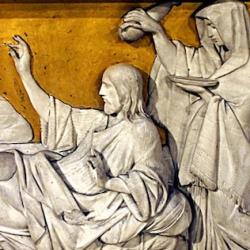Like his earlier book on Revelation, Wes Howard-Brook’s “Come Out My People!”: God’s Call Out of Empire in the Bible and Beyond has its goofy moments, as when he claims that Jesus completely rejected “imperial economics,” by which he means the money economy that allows you to “trade with people with whom one is not in personal, kinship-like relationship.” He bases this on the fact that Jesus has to ask for a coin when someone asks Him about paying taxes. Aside from the economic questions this raises, one wonders what Howard-Brook would do with John 12:6 and 13:29, which refer to an apostolic money-bag, or Luke 22:36, where Jesus commends money-bags to His traveling disciples.
Still, there are some neat things in this book. For instance, he notices the Genesis reference in Matthew 1:1, and links it with 19:28, where Jesus refers to the palingenesis of all things. Howard-Brook nicely glosses this as “The term translated ‘renewal of all things’ means literally ‘genesis again.’” Just so.
He also notes the link between Genesis 1-2 and the story of Jesus’ birth:
“Scholars so routinely speak of Genesis 1-2 as presenting ‘two stories of creation’ that they often forget that this is nothing more than a modern construct based on two alleged ‘sources.’ The author of our gospel certainly has not heard of such a theory. His ‘book of genesis’ parallels the opening chapters of Genesis. That is, Genesis starts with a ‘genealogy’ of heaven and earth, summarized at 2:4. It then continues with a ‘close up’ version that focuses on the creation of the human as male and female. Matthew does the same thing: he begins with a genealogy of Jesus, summarized with a marking of three sets of fourteen ‘generations’ that flow from Abraham to ‘the Messiah’ . . . He then continues immediately with a ‘close up’ version of the ‘birth [ genesis ] of Jesus the Messiah.’” This means that the formation of Jesus in the womb of Mary recapitulates the formation of Adam from the dust.
Howard-Brook also suggests that the magi as “Persian royal officials” link the story to Daniel: “The powerless minions of Nebuchadnezzar in Daniel 2 are transformed into obedience servants of the God of Israel.” This is good, but he mars it by confusing the picture with his anti-imperial bias. For starters, the magi go back home, presumably to continue to serve as “Persian royal officials.” Maybe that’s OK, since Sassanid Persia ain’t Rome. And he reads the magi story in the light of Isaiah 60 (correct) but sees Isaiah and Matthew together as a “counter-narrative to the Ezra-Nehemiah story of collaboration with Persia.” But Ezra-Nehemiah received riches from Cyrus just like Jesus does . What makes Ezra’s reception of the wealth and support of Persia betrayal? Why isn’t Jesus’ implicated for receiving Persian goods? And gold of all things. So much for renouncing the imperial economy.











